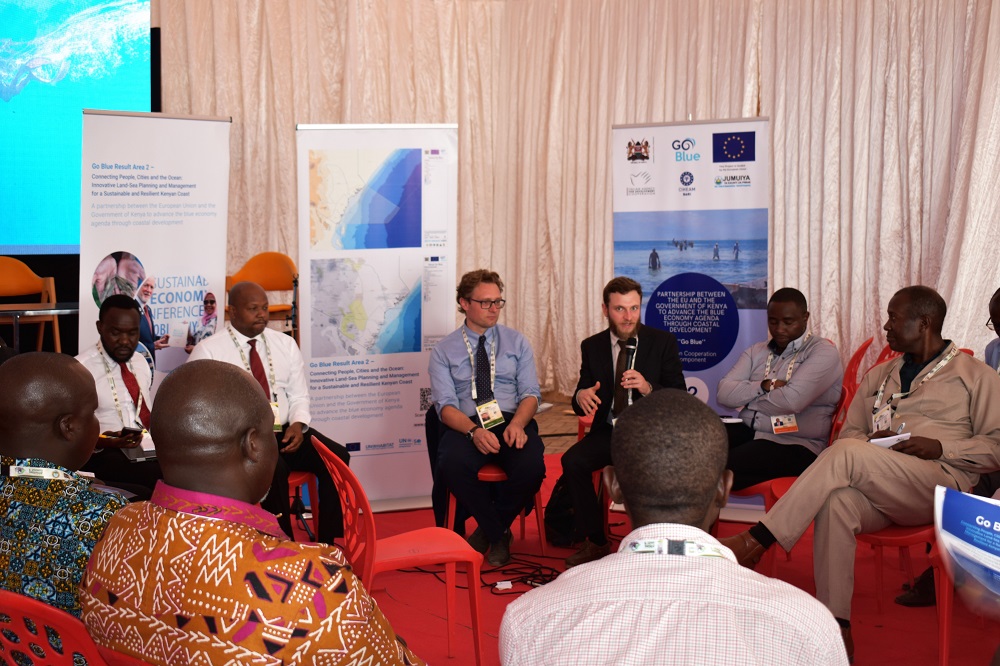
During the first day of the Pan African ‘Africities’ conference, dedicated to sustainable urban development, some of the implementing partners of the EU-funded Go Blue Programme have organized an interactive session focusing on the nexus between the blue economy and intermediary cities. The session aimed at stimulating a debate with the various representatives of local and subnational governments present at the panel on the potential offered by the coastal resources for the sustainable development of the country.
The session was organized by UN HABITAT and UNEP with the participation of the Italian Agency for Development Cooperation (AICS) and the Jumuiya ya Kaunti za Pwani (JKP), Kenya's coast regional counties Economic Development Organization and counted on the participation of various members of the Council of Governors, the organization bringing together the governors of Kenya’s 47 counties. The panel offered a unique opportunity to stimulate an interactive dialogue with local and subnational authorities on themes such as territorial development, knowledge sharing and coastal cities growth.
The session focused on the unexploited potential of the resources offered by the blue economy: according to the 'Nairobi Statement of Intent on Advancing Global Sustainable Blue Economy, oceans, seas, lakes, rivers, and other water resources are key assets for achieving the ambitious goals set in the 2030 Agenda by the United Nations.
Mr. Paolo Damato, the coordinator of the Italian component of the Go Blue Programme, started the debate by recalling the theme characterizing this ninth edition of the Africities Summit ("The Role of Intermediary Cities of Africa in the implementation of Agenda 2030 of the United Nations and the African Union Agenda 2063'') and highlighting the importance of secondary cities in a context like Africa, interested by very rapid urbanization processes and with a rapidly growing population often concentrated in intermediary cities.
The session further explored the nexus between the blue economy and intermediary cities, with a focus on the Go Blue initiative. While the Italian Cooperation component intervenes to support the economic development of coastal cities by strengthening the blue economy value chains, the component led by UN-Habitat and UNEP focuses on enhancing land-sea planning and management by addressing key socio-economic and environmental challenges while stimulating benefits from the blue economy.
It was emphasized that while investments in the blue economy have the potential to catalyze the development of the Kenya coast, an adequate operational environment is also required, with efficient waste management systems that can preserve coastal and marine environments and enable the development of fishing and tourism; a network of urban and regional infrastructures to support the logistics for the blue economy development; resilient urban planning to manage rapid urban growth.
Some representatives of the Council of Governors underlined the importance of identifying knowledge sharing mechanisms to be able to benefit from the best practices developed within the Go Blue Programme, also to possibly incorporate lessons learned in sectoral policies.
The CEO of the JKP Secretariat, Mr. Emmanuel Nzai, reaffirmed the importance of policy dialogues with County governments to improve interventions’ sustainability and underlined that Go Blue is developed in accordance with the local development strategies (the 'County Integrated Development Plans').
The Coordinator of UN HABITAT for the Go Blue Programme, Mr. Florian Lux, stressed that the interventions carried out within the initiative are complementary to the actions already undertaken by local governments so that the UN catalyzes investments already adopted at the local level.
Finally, all participants agreed on the success of the event and on the fact that continuous dialogue coupled with the involvement of all stakeholders is essential for the success of cooperation initiatives.
Unlocking the Potential of Kenyan Coast: Go Blue Strengthening the Blue Economy Value Chains